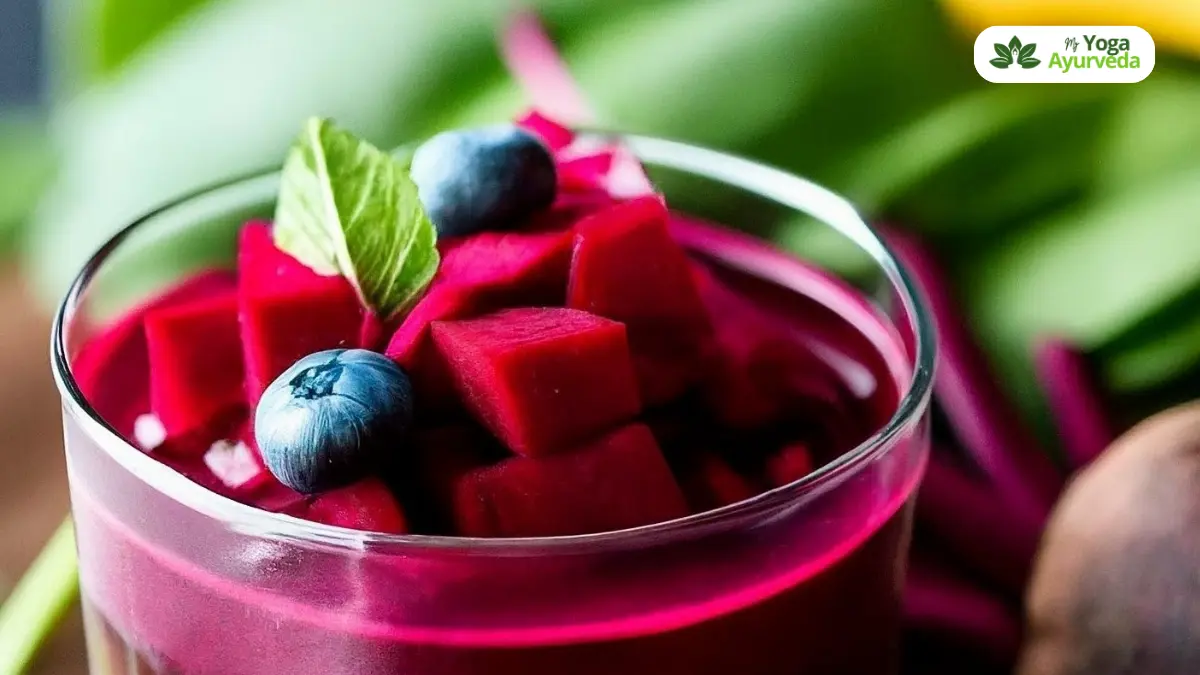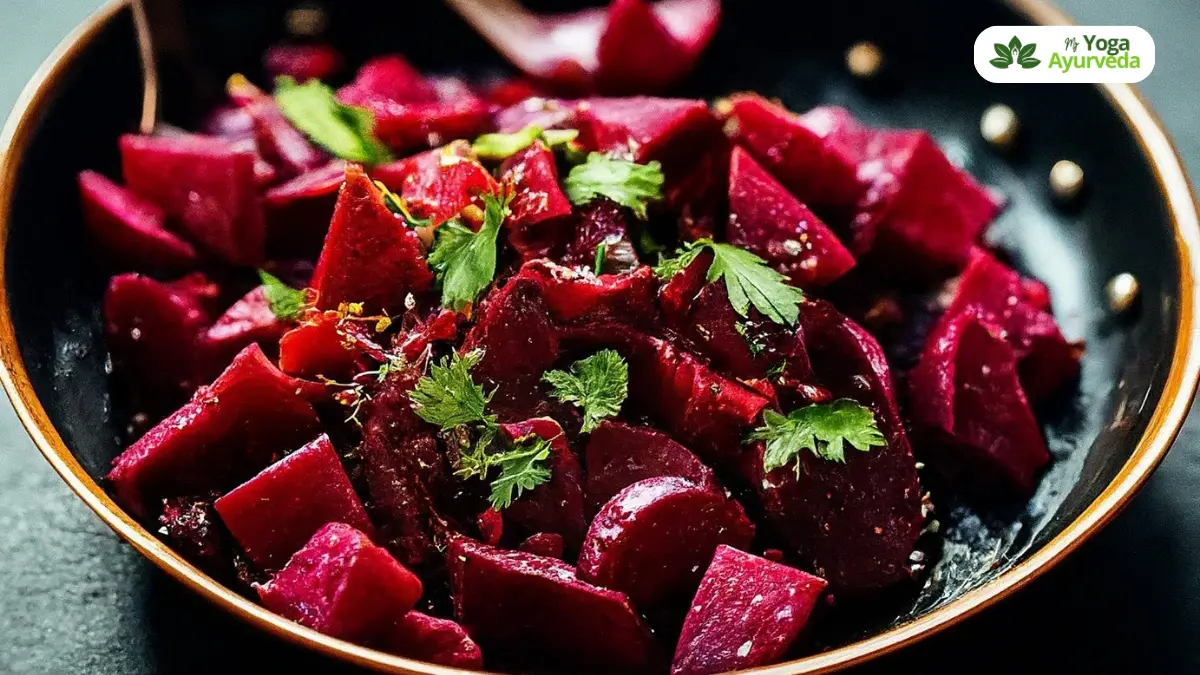
Written by Yoga Mentor Keshav, with facts sourced from Ancient Indian Ayurvedic and Yogic Textbooks, as well as scientific research.
In our busy lives, we often forget about the amazing things nature gives us. Beetroot juice is like a magic potion full of health benefits, proving that simple foods can be super powerful. Scientists back this up – it’s not just a tasty drink; it’s a natural powerhouse that can make you feel better.
Let’s find advantages and also know disadvantages (precautions) of beetroot.
The scientific name of beetroot is Beta vulgaris. Here are 7 health benefits of beet root :
Scientific studies have consistently shown that beetroot juice can be beneficial for heart health and blood pressure. A meta-analysis published in the Journal of Nutrition and Dietetics (2018) concluded that the consumption of beetroot juice significantly lowers both systolic and diastolic blood pressure. The nitrates in beetroot juice play a pivotal role in relaxing blood vessels, improving blood flow, and reducing the risk of cardiovascular diseases.
Athletes and fitness enthusiasts are increasingly turning to beetroot juice as a natural performance enhancer. A study published in the Journal of Applied Physiology (2009) found that dietary nitrate supplementation, as found in beetroot juice, reduces the oxygen cost of submaximal exercise and enhances tolerance to high-intensity exercise.
This indicates that beetroot juice can be a valuable addition to the arsenal of those looking to optimize their workout routines.
This Ayurvedic Medicine is good for men’s health and increases stamina of men.
The positive impact of beetroot juice on brain health has been substantiated by research. A randomized controlled trial published in Nitric Oxide: Biology and Chemistry (2016) demonstrated that dietary nitrate, abundant in beetroot juice, increases cerebral blood flow and improves cognitive performance, particularly in tasks requiring increased neural resources. This suggests that beetroot juice may play a role in supporting cognitive function.
Beetroot juice’s nutritional profile is impressive, and scientific analyses confirm its abundance in essential nutrients. A study in the Journal of Agricultural and Food Chemistry (2015) reported that beetroot juice is a rich source of folate, vitamin C, potassium, and iron. These nutrients play crucial roles in supporting immune function, maintaining cardiovascular health, and aiding in the body’s overall metabolic processes.
Nutritional Value of Beetroot (per 100 grams):
| Nutrient | Amount (per 100g) |
|---|---|
| Calories | 43 kcal |
| Carbohydrates | 9.56 g |
| Sugars | 6.76 g |
| Dietary Fiber | 2.8 g |
| Protein | 1.61 g |
| Fat | 0.17 g |
| Vitamin C | 4.9 mg |
| Folate (B9) | 109 mcg |
| Vitamin B6 | 0.067 mg |
| Potassium | 325 mg |
| Iron | 0.80 mg |
Researchers have delved into the anti-inflammatory properties of beetroot juice, uncovering its potential to combat chronic inflammation.
A review published in the journal Antioxidants (2015) highlighted the presence of betalains in beetroot, which possess anti-inflammatory and antioxidant properties.
Regular consumption of beetroot juice may contribute to mitigating inflammation and reducing the risk of inflammatory-related conditions.
The liver’s role in detoxification is well-established, and beetroot juice has been found to support this vital organ. A study in the Journal of Medicinal Food (2015) suggested that beetroot extract exhibits hepatoprotective effects by reducing oxidative stress and enhancing the liver’s detoxification processes.
This implies that incorporating beetroot juice into your diet may aid in maintaining a healthy liver.
The fiber content in beetroot juice has been studied for its positive effects on digestive health. A clinical trial published in the British Journal of Nutrition (2017) found that dietary fiber, including that from beetroot, promotes regular bowel movements and supports a healthy gut microbiota.

This dual action of fiber makes beetroot juice a valuable addition to a diet aimed at maintaining optimal digestive function.
Also Read : How Triphala is Good for your digestive health.
Here are 3 simple beetroot recipes you can use in your diet in this winter.

Sautéed Beetroot :
Toss beets with a bit of oil, spices, and pop them in the oven until they’re tender. Snack on them or use them as a tasty side dish.
Beetroot Juice :
Beets make a powerful juice. Mix them up with other fruits and veggies for a refreshing and healthy drink. Always use fresh juice, and drink immediately after you make them. One caution, it might turn your pee pink!
Beetroot Smoothies:
Drop beets into your smoothies for a burst of color and natural sweetness. Blend them with berries, spinach, and banana for a tasty and good-for-you breakfast.
While beetroot consumption is generally safe and offers numerous health benefits, it’s essential to be mindful of a few precautions and also remember disadvantages of beetroot to ensure a positive and healthy experience:
Kidney Stones: High oxalate levels in beets may contribute to kidney stones. If prone to stones, moderate beet intake and consult a healthcare professional.
Blood Pressure Medications: Consult your doctor before significantly increasing beet consumption, especially if on blood pressure medication, as beets naturally lower blood pressure.
Allergies: Rare but possible, beet allergies may cause itching, swelling, or difficulty breathing. Seek medical attention if you experience such symptoms.
FODMAP Sensitivity: Beetroot contain FODMAPs, causing digestive discomfort in some. If you have digestive concerns, moderate beet consumption or consult a healthcare professional.
Interaction with Calcium: High oxalates in beets may interfere with calcium absorption. Maintain a balanced diet and consult a healthcare provider if concerned about calcium levels.
As with anything, moderation is essential. While nutritious, excessive beet consumption may lead to nutrient imbalances. Maintain a varied, balanced diet for optimal health.
As we uncover the science behind the benefits of beetroot and it’s juice, it is best for cardiovascular health to exercise performance and cognitive function, beetroot offers a holistic approach to health backed by rigorous research.
So, don’t underestimate the humble beetroot. With its impressive health benefits and versatility in the kitchen, it’s a true superfood waiting to be explored.
Give it a try and discover the vibrant potential it holds for your health and well-being!